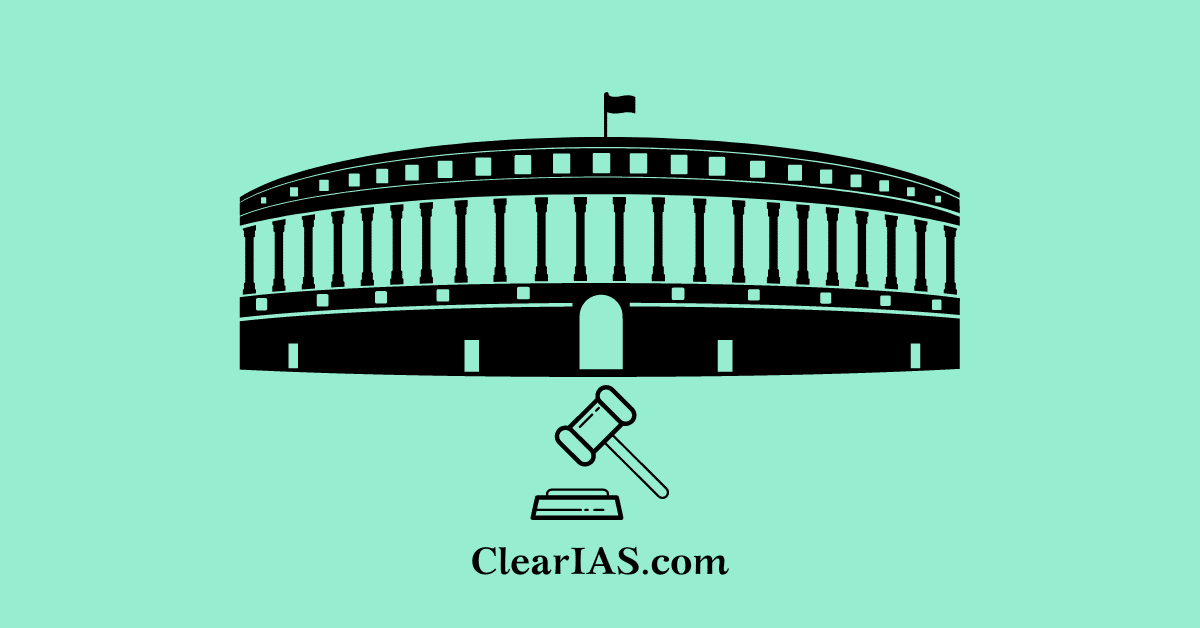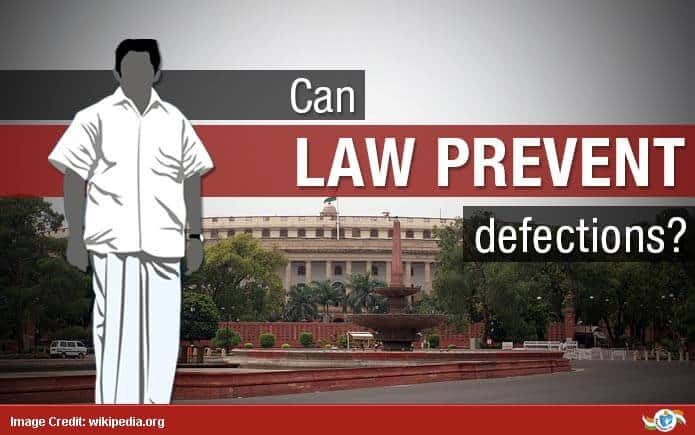 In this post, we discuss the Anti-Defection Law which has been part of the Indian Constitution since 1985. The law sets the provisions for disqualification of elected members on the grounds of defection to another political party (Eg: If elected MPs of Congress shift their allegiance to BJP or vice versa). We will also see the need for reforms in the anti-defection law.
In this post, we discuss the Anti-Defection Law which has been part of the Indian Constitution since 1985. The law sets the provisions for disqualification of elected members on the grounds of defection to another political party (Eg: If elected MPs of Congress shift their allegiance to BJP or vice versa). We will also see the need for reforms in the anti-defection law.
The Anti-Defection Law in India is a legal framework aimed at preventing elected representatives from defecting or changing their allegiance from one political party to another.
This law was introduced to curb the unethical practice of “floor-crossing,” which can lead to instability in governments and compromise the democratic process. The provisions related to anti-defection are primarily enshrined in the Tenth Schedule of the Constitution of India.
What is anti-defection law?
Note: Subscribe to the ClearIAS YouTube Channel to learn more.
The Tenth Schedule of the Indian Constitution is popularly known as the Anti-Defection Act. The original constitution had no such provisions.
It was included in the Constitution in 1985 by the Rajiv Gandhi government. The main intent of the law was to deter “the evil of political defections” by legislators motivated by the lure of office or other similar considerations.
Defection is defined as voluntarily giving up the membership of a political party or voting against the party’s official whip in the legislature.
What are the grounds for disqualification under the Anti-Defection Law?
Elected members can be disqualified on grounds of defection if they violate the party line by either voting against the party, abstaining from voting, or expressing dissent on party matters.
- If an elected member voluntarily gives up his membership in a political party;
- If he votes or abstains from voting in such House contrary to any direction issued by his political party or anyone authorized to do so, without obtaining prior permission.
As a pre-condition for his disqualification, his abstention from voting should not be condoned by his party or the authorized person within 15 days of such incident.
Exemptions: There are certain situations where defection is not considered grounds for disqualification. For example, if a legislator, as a member of one political party, joins another party after a merger between the two parties, it may not lead to disqualification.
Points to be noted regarding anti-defection
- Articles 102 (2) and 191 (2) deals with anti-defection.
- The provision intends to check the corruption/horse-trading in parliament/check the popular phenomenon “Aaya Ram Gaya Ram “ in the Indian polity which started in the 1960s. Note: The intention was never “to bring stability” to governments.
- The law disallows MPs/ MLAs to switch parties after elections, making the members follow the whips issued by their party.
- It also applies to a nominated member if he/ she joins a political party after 6 months of nomination and to an independent candidate if he/she joins a party after the election.
- Refer to the parliament handbook if you need to know the detailed provisions of anti-defection.
Questions of ‘split’ and ‘merger’: Loopholes in anti-defection law

Initially, the law allowed defections if it involved one-third of members, ie. it had provisions regarding exemption from disqualification in case of a ‘split’ in a political party. But undesirably it resulted in mass defections instead of individual defections.
The decision on disqualification is made by the Presiding Officer of the concerned legislative body (Speaker in the case of the Lok Sabha or State Assembly, and Chairman in the case of the Rajya Sabha or Legislative Council).
Reforms to anti-defection law: 91st amendment
The issue of mass defection because of the 1/3rd rule was remedied through the 91st Amendment which increased the bar from one-third to two-thirds. Thus at least two-thirds of the members of a party have to be in favor of a ‘merger’ for it to possess validity in the eyes of the law.
What is not defection?
- A split in a political party won’t be considered a defection if a complete political party merges with another political party.
- If a new political party is created by the elected members of one party
- If he or she or alternative members of the party haven’t accepted the merger between the two parties and opted to perform as a separate group from the time of such a merger.
Is disqualification under anti-defection law judicially reviewable?
The speaker/ chairman of the house has the authority to decide on defection cases. Speaker sits as a tribunal while deciding on defection cases. All proceedings about any question on disqualification of a member of a House under this Schedule are deemed to be proceedings in Parliament or the Legislature of a state. No court has any jurisdiction. However, the decision can be brought to court after the Kihoto Hollohan case of 1992.
The law states that the decision is final and not subject to judicial review. The Supreme Court struck down part of this condition. It held that there may not be any judicial intervention until the presiding officer gives his order. However, the final decision is subject to appeal in the High Courts and Supreme Court.
Does anti-defection law curtail the right of free speech of legislators?
This issue was addressed by the five-judge Constitution Bench of the Supreme Court in 1992 (Kihoto Hollohan vs Zachilhu and others). It held that the law does not violate any rights or freedoms, or the basic structure of parliamentary democracy.
Concerns raised against the current anti-defection law
- It affects the independence of MPs/ MLAs.
- Constitution drafters didn’t intend to give the control of members to political parties. Interestingly, it’s only in the 10th schedule, which was included in 1985 that political parties are mentioned in the constitution. (Also chief whip).
- Many members speak up their minds and convictions –more discussion and thus better debates and solutions in parliament. Anti-defection law is against this.
- In a diverse country like India, members also represent their constituencies. Hence, every member needs to be given voice to give voice to all regions and sections of the population.
- No incentive for MPs/MLAs to research and understand policies.
Possible reforms that can be made to anti-defection law
- Nowadays, no real democratic discussions happen inside political parties about major issues affecting the country. Individual MPs and MLAs need to be empowered to think independently.
- Anti-defection law should be applied only to confidence and no-confidence motions (Dinesh Goswami Committee on electoral reforms, 1990) or only when the government is in danger (Law Commission (170th report, 1999).
- The rationale that a representative is elected based on the party’s program can be extended to pre-poll alliances.
- Instead of giving the Speaker the authority for disqualification, the decision should be made by the president or the governor on the advice of the Election Commission. This would make the process similar to the disqualification procedure as given in the Representation of Peoples Act (RPA).
- There can be additional penalties for defectors as well.
Previous year question
See the UPSC CSE Mains question for General Studies paper 2 in 2013. It has a question (Question No:1) connected to anti-defection.
Question: The role of individual MPs (Members of Parliament) has diminished over the years and as a result healthy constructive debates on policy issues are not usually witnessed. How far can this be attributed to the anti-defection law, which was legislated but with a different intention?
Article by: Mohammed Danish






In view of recent happenings in Karnataka (assembly politics)as well as in Panchayats in West Bengal it is imperative that the entire gamut of defection is reexamined by the Honourable Supreme Court. A candidate is elected on the basis of promises made on behalf of his/her party. When the candidate switches his/her membership he/she should be subjected to reelection right away but not before he/she has spent a minimum of five years out of the legislature. During the intervening period such members will not be eligible to attend the legislature/panchayat or draw any remuneration / benefits. The people of India will benefit from their absence from the scene.